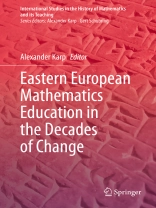This contributed volume is devoted to the recent history and evolution of mathematics education in Eastern Europe, exploring how it was influenced by social and political changes in this part of the world. Despite the broad recognition of the importance of these changes, little scholarship exists that examines the ways in which they were followed by changes in the teaching of mathematics in the post-socialist countries. Indeed, the analyzed processes are complex and vary across the states. Accordingly, this book touches on many factors–including differences in cultures and traditions – that find expression in the teaching of mathematics.
Specifically, this volume seeks to explore what changes there were in education in general and in the position of mathematics in school education in these years, and how these changes may be explained and documented; what changes there were in the content of mathematics education and its assessment, and how were they motivated andadopted; what new textbooks appeared and what new methodological ideas were offered in them; how and why mathematics teacher education and/or professional development changed; what was the role (if any) of foreign influences on mathematics education, etc.
The book will be of interest to both researchers in mathematics education and practitioners-teachers, as well as a broader audience of historians and educators exploring the political aspects of education.
Table of Content
Introduction: A Time of Changes: What Is Its Interest to Mathematics Educators?.- Chapter 1: Mathematics Education in the Czech Republic since 1989.- Chapter 2: Mathematics Education in Eastern Germany since 1990.- Chapter 3: Mathematics Education in Estonia since 1991.- Chapter 4: Mathematics Education in Hungary since 1989.- Chapter 5: Mathematics Education in Poland since 1989.- Chapter 6: Mathematics Education in Russia since 1991.- Chapter 7: Mathematics Education in Ukraine since 1991. Conclusion: Trends and Outcomes.
About the author
Alexander Karp is a professor of mathematics education at Teachers College, Columbia University. He received his Ph.D. in mathematics education from Herzen Pedagogical University in St. Petersburg, Russia, and also holds a degree from the same university in history and education. Currently, his scholarly interests span several areas, including the history of mathematics education, gifted education, mathematics teacher education, and mathematical problem solving. He served as the managing editor of the International Journal for the History of Mathematics Education and is the author or editor of over one hundred publications, including over thirty books.












